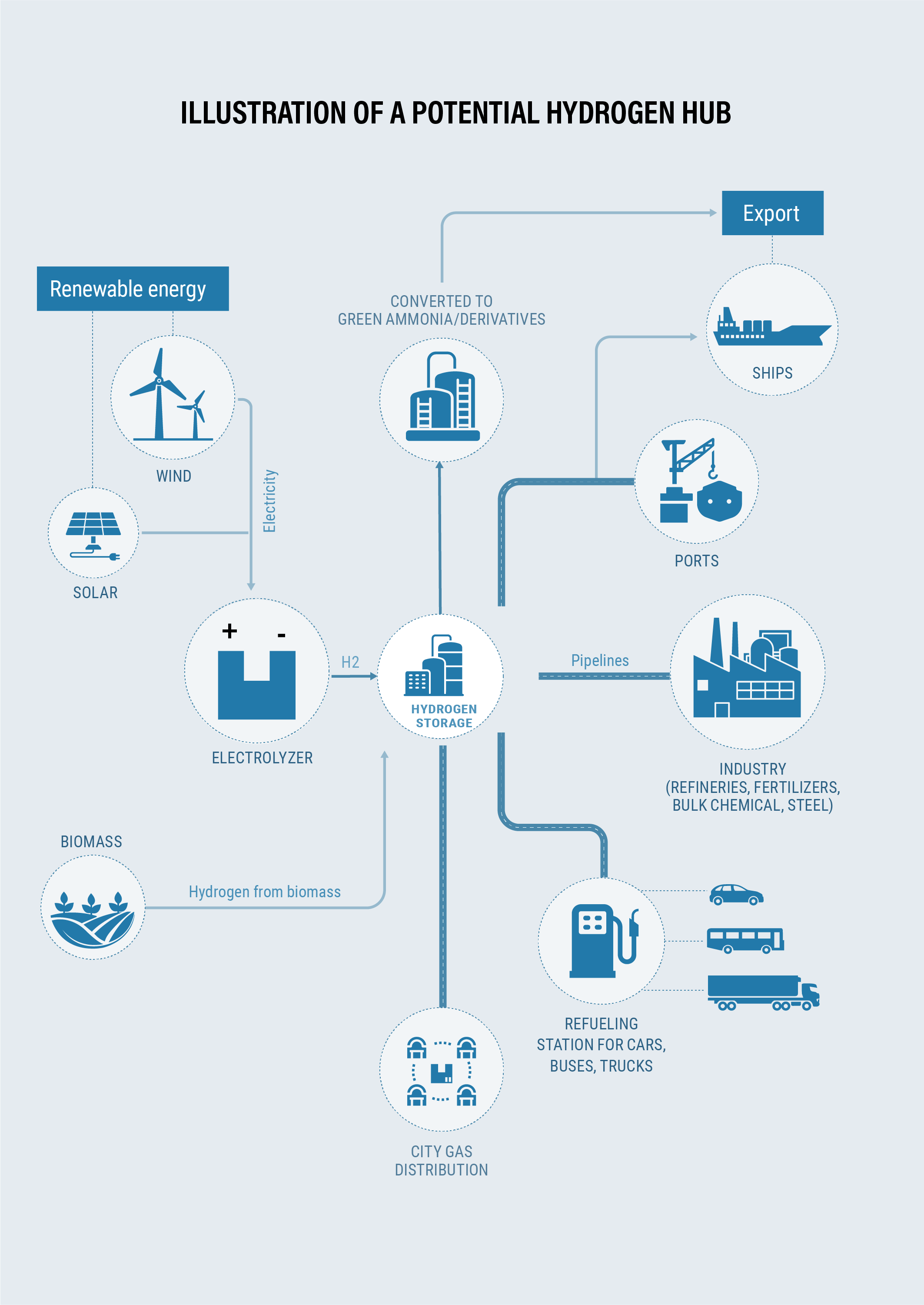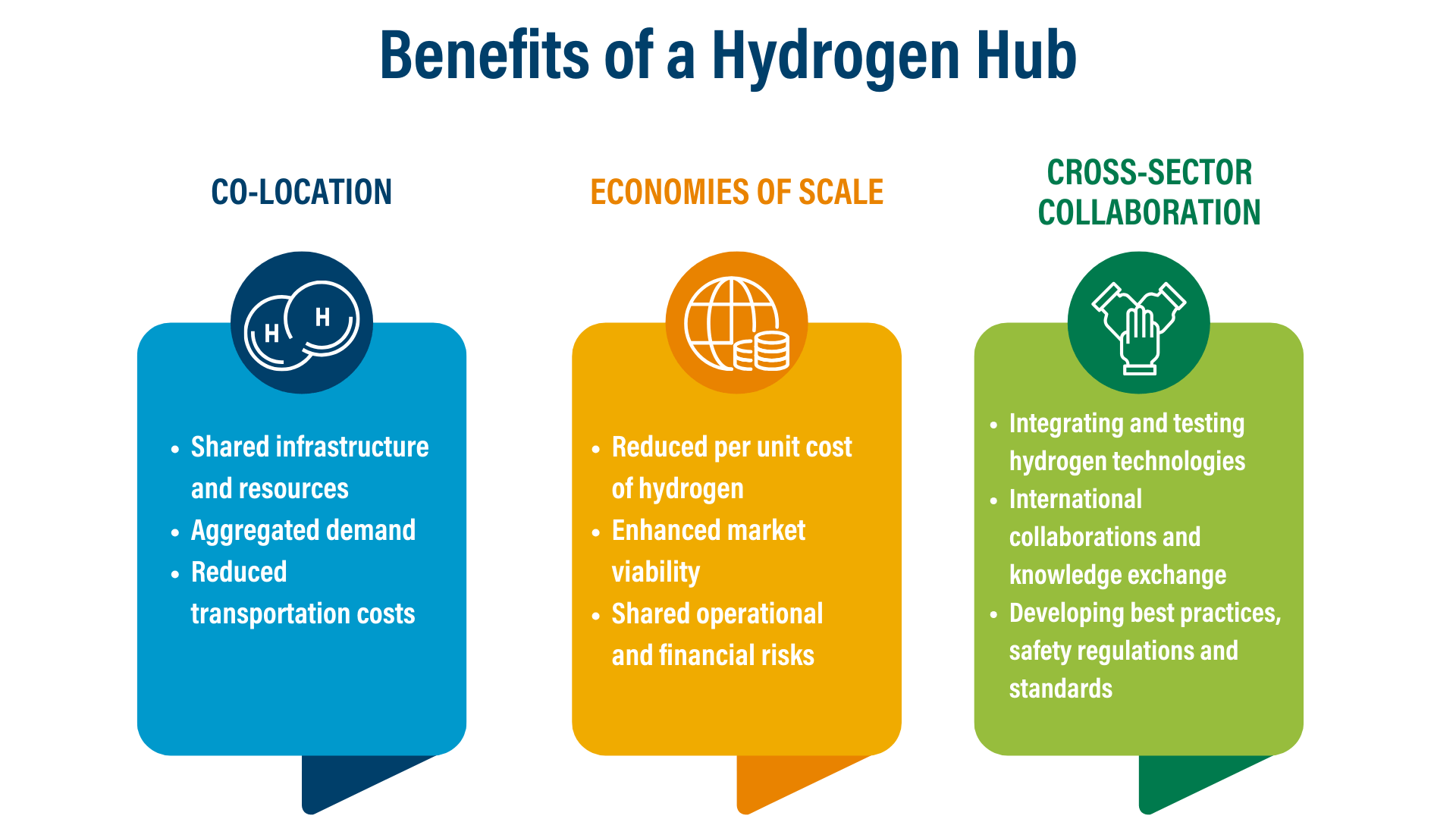
Why are Hydrogen Hubs Crucial for Accelerating Green Hydrogen Adoption?
This blog post is the first in a two-part series on the relevance of hydrogen hubs and key elements for their development. This part explores the significance of hydrogen hubs and their potential for accelerating the adoption of green hydrogen.
India currently consumes around 5 million metric tons (MMT) of hydrogen annually, of which 99% is used for petroleum refining and ammonia production. Most of this is grey hydrogen, meaning that it is produced from fossil fuels, the majority of which are imported. Demand for hydrogen has been growing globally, production of which is responsible for 830 MMT of global CO2 emissions per year. Green hydrogen will play a crucial role in meeting climate commitments and decarbonizing hard-to-abate sectors. Promoting green hydrogen can effectively reduce emissions and support the transition to a low-carbon economy, however it is yet to become cost-competitive with grey hydrogen.
What is a Hydrogen Hub?
A hydrogen hub is an integrated hydrogen ecosystem that includes production, transportation, distribution and consumption within a geographical proximity. A hydrogen hub brings together stakeholders including green hydrogen producers, multiple consumers and connective infrastructure. This has numerous advantages over traditional hydrogen supply chains, which typically involve a single large hydrogen consumer, such as a chemical plant or refinery, catered by a hydrogen producer.

Role of Hydrogen Hub in Addressing Cost and Infrastructure Challenges
The production cost of green hydrogen depends largely on the cost of input renewable energy, the capital cost of electrolyzers and the cost of plant systems. Besides, transporting and storing the hydrogen involves costly high-pressure cylinders, cryogenic tanks, or pipelines, leading to distribution and storage costs up to three times the production cost.
Hydrogen hubs can address some of these challenges by establishing trunk infrastructure for the production and distribution of green hydrogen, which can be shared by multiple consumers. Co-locating key stakeholders and integrating production and consumption through a localized ecosystem can enable the sharing of financial and operational risks. A strategic approach for the development of a hub would be to identify locations with existing demand as well as with potential future demand for upcoming hydrogen applications in transport, industrial processes, energy storage or feedstock. This would significantly reduce the delivered cost of green hydrogen, making it a competitive alternative to grey hydrogen.
Benefits of a Hydrogen Hub
A hydrogen hub can provide a captive market for a hydrogen production facility by enabling economies of scale and reducing the per unit cost of hydrogen. Its proximity to consumption sites will also reduce the need for transportation, enabling bulk procurement and cost-effective delivery of green hydrogen and its derivatives.
The hubs can serve as a platform for cross-sector partnerships, enabling knowledge exchange and resource-sharing among stakeholders, including hydrogen consumers and producers, renewable energy producers, regulators and policymakers. This multi-stakeholder collaboration will enhance existing processes, optimize overall operation and enable the advancement of green hydrogen technologies.
The hubs will also provide a platform for testing and demonstrating new use cases for hydrogen, facilitating the integration and adoption of green hydrogen in various technologies and applications, such as hydrogen-powered vehicles, industrial heating processes, chemical manufacturing, synthetic fuels, and the generation and storage of electricity. The successful development of hydrogen hubs can also lead to other benefits, such as job creation, the development of regulations, safety standards, testing protocols and best practices, and international collaborations.
Establishing such hubs within Special Economic Zones (SEZs) will provide policy incentives and financial benefits, reducing the cost and complexity of setting up facilities throughout the hydrogen hub supply chain. Similarly, hubs near manufacturing and industrial zones can support infrastructure development and provide aggregated demand for hydrogen. Ports can also play a significant role in facilitating the import and export of green hydrogen and its derivatives.

Port of Rotterdam: A Working Model
The concept of the hydrogen hub has gained traction across the world, with several countries endorsing it in their decarbonized hydrogen strategies. Port of Rotterdam in the Netherlands is a good example for the strategic development of a hydrogen hub. Leveraging its existing infrastructure and resources, including pipelines, storage bunkers, and industrial and manufacturing facilities, the port provided a strong foundation for the hydrogen hub’s establishment.
The proximity to various industries within a 30-kilometer radius minimized the need for hydrogen transportation and reduced storage costs. The hub-based approach in Rotterdam facilitated the creation of a comprehensive ecosystem, becoming home to numerous educational and research institutes as well as several high-tech startups and pilot projects for advancing hydrogen technologies.
With numerous policies and projects across the world, clean hydrogen is gaining significant momentum due to its positive impact on the environment and economy. Hydrogen hubs have enormous potential for driving green hydrogen adoption across hard-to-abate industries to reduce emissions, spur research and innovation on hydrogen technologies, create jobs, and promote the international trade of green hydrogen and its derivatives.
All views expressed by the authors are personal.